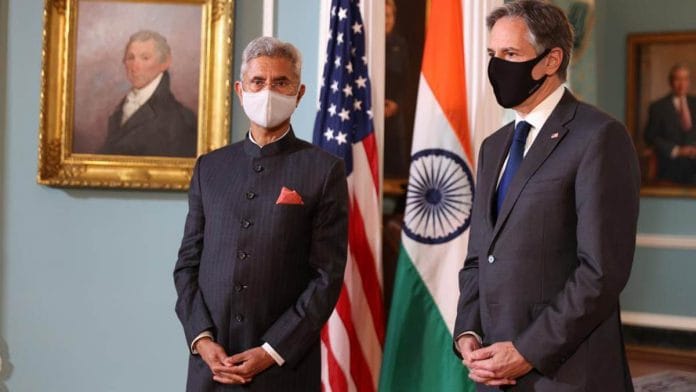US Secretary of State Antony Blinken is coming to town today, the second visit by a senior US official to India in the Joe Biden administration and a fascinating one if you read between the lines. Blinken is here to shore up India’s fight against China and deepen New Delhi’s partnership in the Quad. He will likely talk about Afghanistan. And then there is climate change.
A Quad leaders’ summit – between the US, Japan, Australia, and India — is on the anvil, which means Prime Minister Narendra Modi is going to rub shoulders with the big boys. And despite the fact that India is deeply invested in the Chinese economy and has suffered enormous damage from the second Covid wave, the US realises that India is still the only country with the potential to take on China.
The second important political lesson this week is being taught by none other than the beleaguered Afghans. Note how Afghanistan’s National Security Advisor Hamdullah Mohib — who knows full well that the Americans have essentially given Pakistan a veto on their country’s future — has reached out to the bête noire of the Pakistani military establishment, former Pakistan prime minister Nawaz Sharif.
My enemy’s enemy, Mohib seems to be saying, could be my potential friend. The meeting has created a huge furore in Pakistan, even though it may perhaps amount to nothing. It could even look like a desperate act by two desperate men. But both Mohib and Nawaz know they have nothing much left to lose. So why not go down fighting, along with a bit of sound and fury signifying nothing?
Interestingly, Blinken’s visit has been preceded by some of the drama that usually accompanies a Democrat leader’s trip to India. US acting assistant secretary of state Dean Thompson has said Blinken will raise the matter of human rights violations in India; the Ministry of External Affairs (MEA) has responded with alacrity, pointing to India’s democratic credentials.
But the reality on the ground is somewhat different. The Americans know they have to be seen to be speaking to their own Democratic base, which believes that human rights are a key element of foreign policy. But even if the Americans are holding their nose on the mounting cases of sedition and infringement of freedoms under the Modi government, they are hardly likely to antagonise India – not just because India isn’t a bit player like Mali or Montenegro, but because it has proven itself to be a significant player by holding firm against China in Ladakh for the past year.
Modi’s China gamble, at least for the moment, has paid off.
Also read: India confident Kabul won’t fall to Taliban, is moving on ‘multiple tracks’ on Afghanistan
Plain-speak on Afghanistan and Pakistan
On the Afghanistan front, things are more complicated. A cup of tea with Nawaz Sharif notwithstanding, Mohib knows that Afghanistan’s fate is in the hands of the Americans; that Pakistan NSA Moeed Yusuf and ISI chief Gen. Faiz Hameed have been invited by the Biden administration to visit Washington DC next week.
Moreover, Mohib has probably come to terms with the idea that Biden himself is not looking at just one sovereign authority to run Afghanistan.
So what should India do? On the one hand, it has partnered with the US in the Pacific, by being a member of the Quad, but on the other, it’s apparent that its good friends, the Americans, have thrown in their lot with the Pakistanis.
The best course of action, of course, is to follow the Middle Path. Jaishankar is reaching out to Iran as well as to the Taliban, in the hope that India can get a foot in the door, even if it’s a bit too little, too late.
India’s Afghan policy has been awry these last few years, despite having some of the best minds on Afghanistan. It hit the nadir when two Indian diplomats went to a Moscow meeting in 2018 and were given instructions not to even look at the Taliban across the table, leave alone engage with them. From there to determinedly supporting Ashraf Ghani – whom the Americans wanted elected President, but who can’t even control Kabul as a series of rockets falling outside his palace during Eid prayers demonstrated – instead of Afghan peace negotiator Abdullah Abdullah to now holding back-channel talks with the Taliban, India’s Afghan policy has been a tragicomic act of errors.
Blinken’s visit is a great opportunity for both sides to do some plain speaking. Does the US Secretary of State, like his predecessor Hilary Clinton, also think that Pakistan continues to feed the hydra-headed snake of terrorism? And perhaps External Affairs Minister S. Jaishankar can tell us how India sees the world in this time of great chaos.
The author is a consulting editor. She tweets @jomalhotra. Views are personal.
(Edited by Prashant Dixit)






